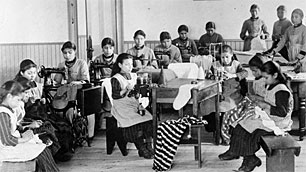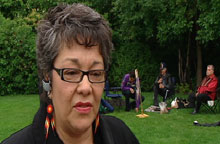CBC News
September 13, 2010
http://www.cbc.ca/canada/british-columbia/story/2010/09/13/bc-aboriginal-day-school-lawsuit.html
 |
| Students are seen at an Indian residential school classroom in Resolution, N.W.T. Students are seen at an Indian residential school classroom in Resolution, N.W.T. (National Archives of Canada) |
Hundreds of aboriginal people on Vancouver Island have joined a class action lawsuit alleging they were victims of abuse at Indian day schools, much like native residential school students who recently received government compensation.
Philomena Alphonse, who attended St. Catherine's Indian Day School in the Cowichan Valley during the 1940s and '50s, is among the 800 Vancouver Island First Nations members who have joined a country-wide, class action lawsuit against the federal government and several churches.
Alphonse says she and her fellow day students were subjected to the same kind of abuse that many students suffered at residential schools. The only difference was she and her classmates went home to their parents at night.
Now she is hoping the lawsuit will result in recognition and some kind of help.
"What I'm hoping now is some kind of help, because we're faced with high unemployment, high dropout rate, alcoholism and drug abuse," said Alphonse.
$15B in damages sought
Joan Jack is the Winnipeg lawyer leading the class action lawsuit, which now represents thousands of day school students across the country.
Jack also compares the situation to the widespread abuse of aboriginal children at native residential school during the same era.
"It's exactly the same," said Jack. "It's just at night, children got to go home to their parents."
In the claim, the school survivors say they were physically and sexually abused and stripped of their language, culture and heritage. They are seeking $15 billion in damages.
If successful, the class action lawsuit could apply to an estimated 75,000 aboriginal students who attended government-funded, church-run day schools during the residential-school era.
According to Ray Mason, who heads the Manitoba group Spirit Wind that is leading the lawsuit, many of the students lived in convents, boarding houses, hostels and orphanages, rather than in school dormitories, or went home to their families.
 |
| Winnipeg lawyer Joan Jack filed the lawsuit in 2009 on behalf of the day school survivors. Winnipeg lawyer Joan Jack filed the lawsuit in 2009 on behalf of the day school survivors. (CBC) |
In June 2008, Prime Minister Stephen Harper stood in the House of Commons and offered a formal apology and $1.9 billion in compensation to about 80,000 former students who attended residential schools.
Overseen by the Department of Indian Affairs, the church-run residential schools aimed to force aboriginal children to learn English, and adopt Christianity and Canadian customs as part of a government policy called "aggressive assimilation."
No apology yet
Jack says, unlike the residential school students, the day school students have never received an apology, let alone compensation, for what they allegedly went through.
"Children were beaten excessively, children were beaten for speaking their language, children were sexually abused, children were physically abused," said Jack.
But the lawsuit is about more than money, she said.
"It's really more about giving the people the opportunity to be heard and to have their day in court," she said.
Jack expects the lawsuit will take years to resolve, and she's hoping the federal government and the churches involved will come forward sooner, with apologies and the money to help individuals and their communities heal.
Any original material on these pages is copyright © BishopAccountability.org 2004. Reproduce freely with attribution.